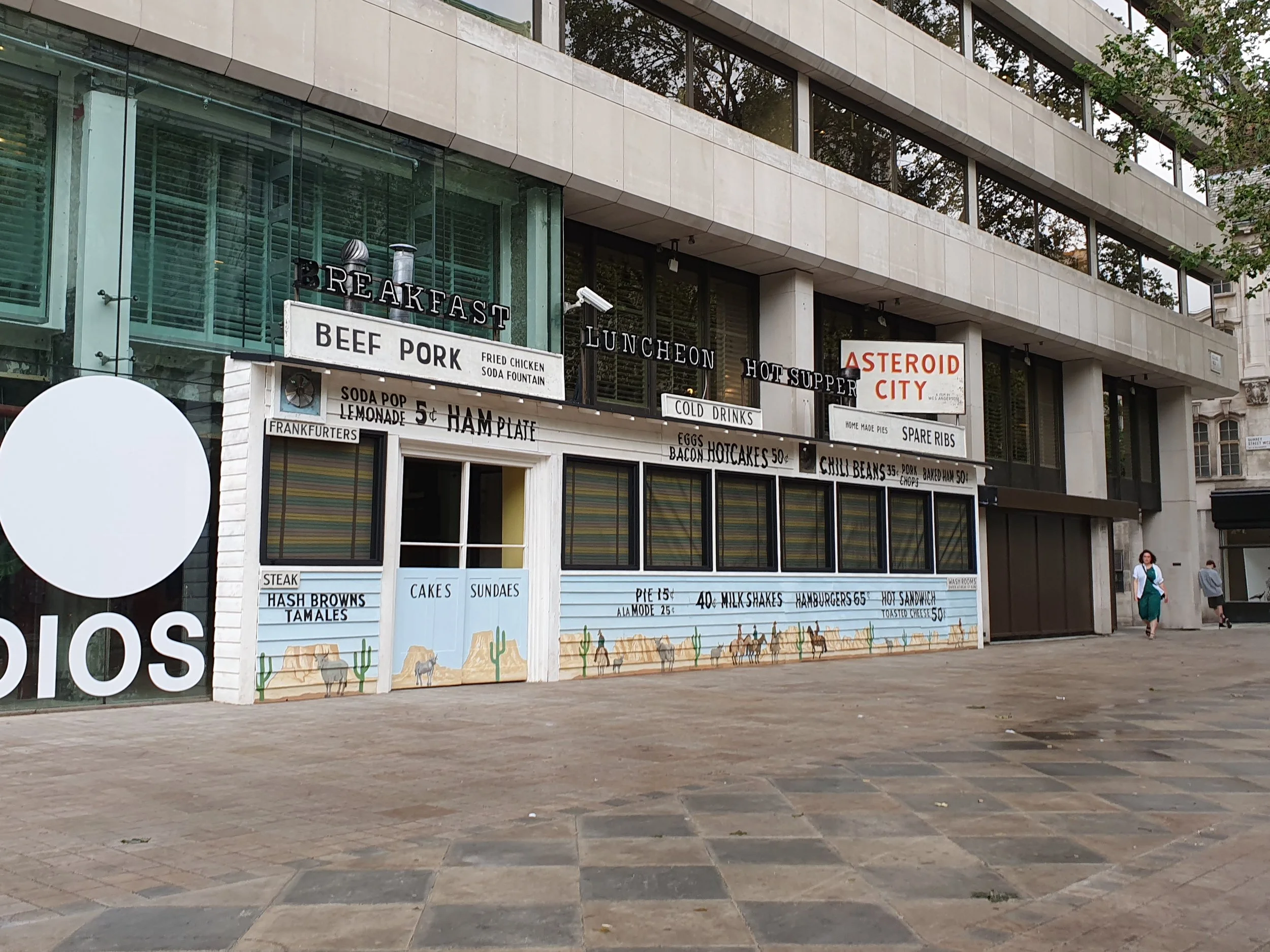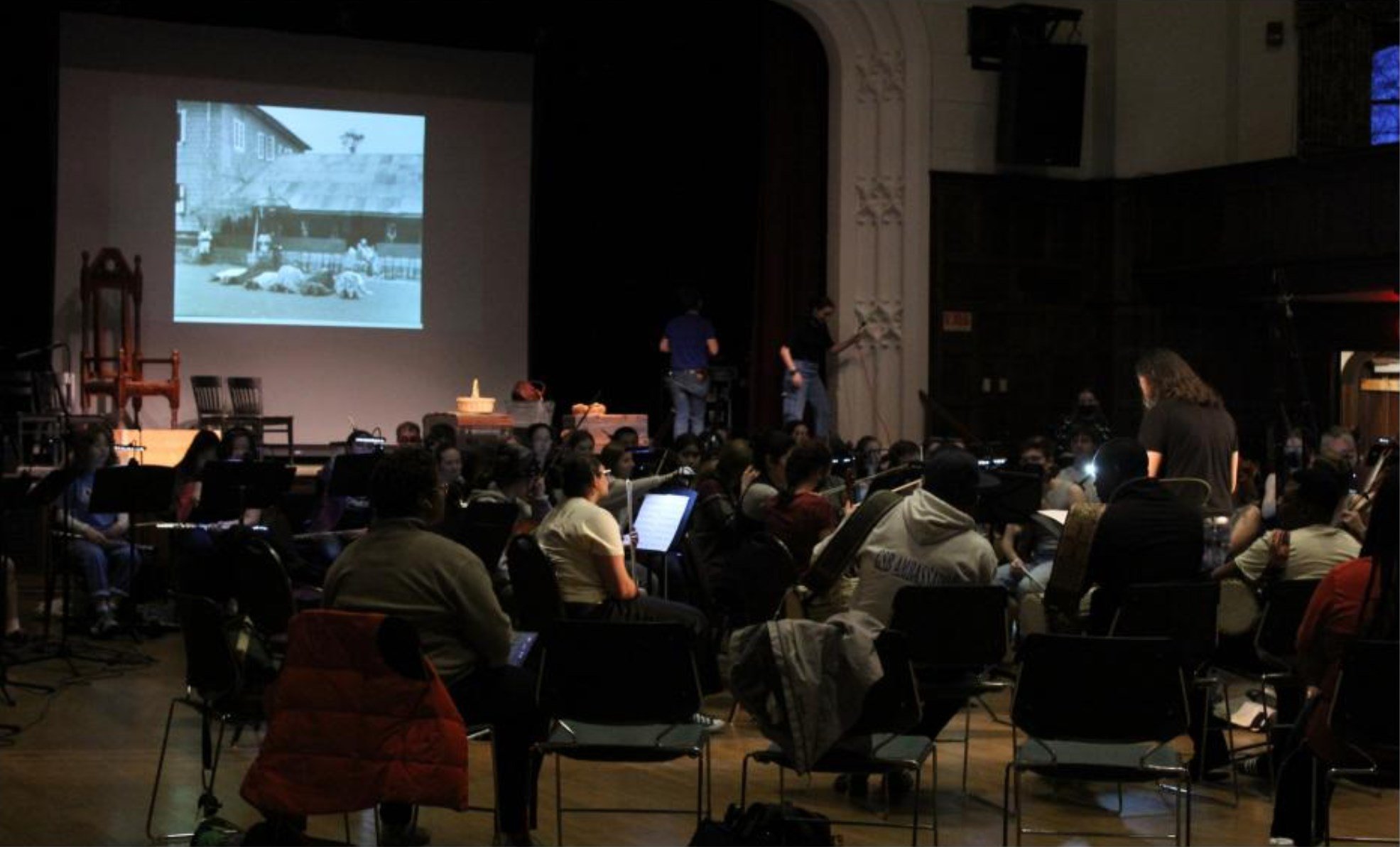This past weekend, attendees of the Department of Film Media Theater’s “Night of Scenes” were treated to not one but four distinct narratives. Students put on four scenes from Dominican writer Juliany Taveras’ 2016 play “the anatomy of light,” one from Theresa Rebeck’s “Mauritius,” Jonathan Yukich’s “A Brief History of Weather” and David Ives’ “Sure Thing.”
Musician Chmba Ellen Chilemba ’17 talks on grief, gratitude, President Holley’s inauguration and reflects on her time spent at Mount Holyoke
Today, many on campus know Chmba Ellen Chilemba ’17, better known by her stage name CHMBA, as the DJ who performed at President Danielle R. Holley’s 90s-themed inauguration party. The talented musician has opened for musicians like American pop star Madonna and Benenise singer-songwriter Angelique Kidjo. Her second EP, “Okongola Caucus,” came out earlier this year.
'One More Time': Blink-182 returns to the old days
Pop-punk is back.
In the past two years, Paramore, Simple Plan and Taking Back Sunday have all released full-length albums. Say Anything, Green Day, Busted and Hawthorne Heights are coming out with new songs. Amidst the revival of a genre they helped pioneer, it only makes sense that Blink-182 would come back as well — though, to be fair, they’ve been consistently releasing since 1994.
More than just a TikTok trend, Wes Anderson’s style elegantly serves the story of ‘Asteroid City’
A small desert town in the midst of the Cold War, a science competition for kid geniuses and an alien landing: these are all part of the play at the center of “Asteroid City,” Wes Anderson’s newest film. The film frames itself as an anthology television series retelling the history of a play called “Asteroid City.” We meet the playwright and the actors and gain a description of the setting.
The story kicks off when the play itself begins. By putting these different narratives on top of each other, “Asteroid City” positions itself as a discussion of grief and self-realization. Anderson’s ability to dive deep into the fragility and beauty of the human experience, even within the strangeness of his own style, is what makes him an enduring modern filmmaker.
Mitski explores loneliness, grief, and approval in seventh studio album
Mitksi’s music manages to encapsulate universal emotions in two or three minutes. She uses simple metaphors and beautiful music to represent things that can’t quite be captured in words, which is likely what inspires the undying devotion of her fans. Arguably, there’s not a person alive who can listen to a Mitski song and not relate in some way. Beyond simply inspiring empathy in her listeners, Mitski makes pain feel precious, longing feel divine, and happiness feel infinite.
‘Nadie sabe lo que va a pasar mañana’: The Return of Trap Bunny
‘The Wolves’ scores points with the Mount Holyoke community
Amid the rainy weather of friends and family weekend, members of the Mount Holyoke College community gathered in Rooke Theatre for a sold-out performance that marked the first theatrical production of the 2023-24 school year. Soccer balls were kicked — not into the audience, as Melanie Cosdon ‘26 mentioned to the Mount Holyoke News with pride — whistles were blown and the audience was moved to tears.
‘Spiderman’ was beautiful, emotional, and full of new spiders
'Madame Architect’ highlights women’s voices in architecture, emphasizes community
An innovator in the architectural world, Julia Gamolina is a New York City-based architect, writer and educator best known for her digital magazine Madame Architect, which both highlights the stories of and builds community for women architects.
Gamolina was invited to speak in Gamble Auditorium on Wednesday, Sept. 27, for the event “Towards Madame Architect: Dialogues for a Different Future,” where she talked about her startup and offered career advice to students.
Historic Hollywood writer’s strike reaches a deal with AMPTP
Paul McCartney reveals that artificial intelligence helped formulate one final song from The Beatles
“Mutt” brings a complex portrait of a queer, trans man to the big screen
Nicolas Cage is a bloodsucking professional in new Dracula film
“Renfield” is a ridiculous, campy and excessively gory new adaptation of the story of Dracula — it is fantastic, provided that those adjectives appeal to you. The film pays its dues to the Draculas that came before it, even making direct cinematic references to the 1931 “Dracula” starring Bela Lugosi. The backstory comes in a “flashback” montage that recreates moments from that film, including the iconic lighting that illuminates just his eyes. Set in present-day New Orleans, Robert Montague Renfield (Nicholas Hoult), Dracula’s familiar, finds himself hoping to escape Dracula’s control. He has been serving Dracula (Nicolas Cage) for 90 years, bringing him victims and defending him from his enemies. In exchange, he receives agelessness and a fraction of Dracula’s powers, which he activates by eating insects.
Fifth season of ‘The Marvelous Mrs. Maisel’ shows promise
Amazon Prime Video’s Emmy-winning comedy “The Marvelous Mrs. Maisel” has returned to the streaming service for its fifth and final season. In an attempt to stir up some hype for the show after a disappointing fourth season, only three episodes of the last season have been released. The remaining episodes will be released one at a time in the coming weeks. Hopefully, the upcoming episodes will be just as exciting and fresh as their serialized method of release because so far, season five is carrying on just like season four — redundant and forgettable.
‘The Moors’ was a showcase of top Mount Holyoke talent
“The Moors” begins slowly. It is evident early on that this play is a “Waiting for Godot” situation, and Master Branwell, whom Emilie is waiting to meet, will not be making an appearance and perhaps doesn’t even exist. The repetitiveness of the scenery leaves the audience feeling stuck in the moors, just as the characters are. We find the characters moving from room to identical room.
African opera 'Funmilayo' is a display of varied talents
Nobody ever wants to pay taxes. The sentiment is in the air — April 18 is Tax Day! — as well as the arts. “Funmilayo,” the fourth production in the African opera series at Mount Holyoke, explores just one moment in the rich life of Funmilayo Ransome-Kuti: when she fought British colonial rule in what is now present-day Nigeria through protests against a special tax imposed on women in the 1940s.
boygenius releases first full-length album, ‘the record’
“Indecent” centers queer, Jewish resistance to censorship
Frances O’Connor’s ‘Emily’ is more romance than biography
New Yo La Tengo album looks frankly at the state of the world
Yo La Tengo, a New Jersey-based band founded in the 1980s, released their 17th album, “This Stupid World,” in February. The album’s nine songs trace topics such as aging, death, and perseverance. Photo courtesy of Ricardo Romanoff via Flickr.
By Lucy Oster ’23
Arts & Entertainment Editor
I am always wondering if life is either good or bad — a reductive way of looking at the world, but I can’t help it. Lately, I’ve been reluctantly settling on the latter, as romantic heartbreak looms eternally and trains tip and spill poison. When I feel like this, I turn to people with years on me, who have seen so much bad and good that they’ve learned to take the two extremes with a grain of salt, knowing it can all change so quickly.
“This Stupid World,” released on Feb. 10, is the 17th album from New Jersey-based band Yo La Tengo. Clocking in at nine songs, a respectable number for an objectively late-career release, “This Stupid World” does not blow up the Yo La Tengo sound established on prior albums such as their previous 2018 album, “There’s A Riot Going On,” in any way, and that can be appreciated in a world that can be so destructive otherwise. After all, how can artists remain authentic and produce something unorthodox if they’ve spent decades consistently releasing albums? Specifically, how can an independent rock artist continue writing music about love and sadness, the most obtuse yet overdone topics? The answer to these questions has yet to be discovered, but it’s clear that Yo La Tengo has a clue, and their new album can help steer you through the messy nuances of life.
The album starts as expected for an indie rock band: with a lot of messy guitar and a steady drumbeat. Yo La Tengo formed in the 1980s, and this will likely affect their music style for as long as they produce it, with rougher-sounding musical attributes and soft vocals defining the band. These sounds are present on the new album, and especially in the two first songs on the album, “Sinatra Drive Breakdown” and “Fallout.” The songs on “This Stupid World” are generally lyrically lean with longer musical interludes. The lyrics that do emerge are poignant to many aspects of life. The album, after all, has a title that seeks to define the world, and the band has certainly been around the block.
“Fallout,” the first single and the album’s most-played song on Spotify, is about a desire to “fall out of time” because “every day it hurts to look.” The sentiment is not positive, but it’s delivered in an honest tone. As I listen to the song, I cannot always disagree with the desire to fall out of time briefly, and I feel relieved that I am not so alone in it.
Much of the album seems to cover aging and even death. “Until It Happens,” asks the listener to “Look away from the hands of time” and even “Prepare to die.” The last song on the album, “Miles Away,” wisely remarks: “The pain creeps in anyhow / You feel alone / Friends are all gone / Keep wiping the dust from your eyes.” The “keep” in the action of wiping the dust from your eyes is key to “This Stupid World.” Consistency and keeping on will change one’s perspective on life from bad to good and back again forever until it all ends.
Nuance is everything in this stupid world, and everything in “This Stupid World” as well. The songs are sonically harsh with soft lyrics, and the meaning behind the lyrics is full of nuance as well. “Sinatra Drive Breakdown” has the lyric “I see the moon rise as the sun descends.” Change is the only constant that we can rely on. Still, not all of the songs on the album are so bleak, as not all aspects of life are. “Tonight’s Episode” is bouncier than the other songs in Yo La Tengo’s repertoire, with fun lyrics about walking dogs, milking cows and the Japanese dish Shabu-shabu. Vocalist and guitarist Ira Kaplan even remarks, “I’ll show you a yo-yo trick.” Kaplan and one of the other members of the three-person band, Georgia Hubley, are married, and that domesticity shines through in “This Stupid World.” Married life also appears on the album in sadder ways, such as the song “Apology Letter,” where Kaplan sings, “If I were to smile at you / Would you smile at me?”
At the beginning of “Aselestine,” the second single, Hubley chuckles in the song’s prelude before sharing a gentle song. The lyrics are not sweet, proclaiming, “Where are you? / The drugs don’t do / What you said they do.” Yet, the tone is lifting and a release from the sonically harsher noises. Here, Yo La Tengo demonstrates that a compositionally soft song can encompass some of the bleakest lyrics, the opposite of their usual mode of louder songs and sweeter lyrics.
“This Stupid World” reveals that we cannot separate the bad and good from life. They are intricately tied up together, and they both make the other stronger with their contrast. I can, and even have to, appreciate both if I want to enjoy living even a little bit. After all, as the album’s titular song says, “This stupid world / It’s killing me / This stupid world / Is all we have.”



















